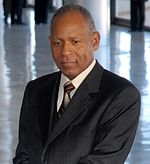Trinidad and Tobago general election, 2010
|
|
||||||||||||||||||||||||||||
|---|---|---|---|---|---|---|---|---|---|---|---|---|---|---|---|---|---|---|---|---|---|---|---|---|---|---|---|---|
|
||||||||||||||||||||||||||||
|
|
||||||||||||||||||||||||||||
|
All 41 seats to the House of Representatives |
||||||||||||||||||||||||||||
|
||||||||||||||||||||||||||||
|
||||||||||||||||||||||||||||
A general election was held in Trinidad and Tobago on May 24, 2010. The date of the general elections was announced by Prime Minister Patrick Manning on April 16, 2010, via a press release. The election was called over two years earlier than required by law. Polls showing that the UNC-led opposition coalition was likely to win the election were confirmed by the subsequent results.
With preliminary results showing the People's Partnership coalition likely to win a majority of 29 out of a possible 41 seats, Patrick Manning conceded defeat on election night. The final outcome has the People's Partnership winning 29 seats, and the PNM winning 12 seats. As a consequence of the People's Partnership's win, Kamla Persad-Bissessar of the People's Partnership coalition was elected Trinidad and Tobago's first female Prime Minister.
In 2015, former minister and international football executive Jack Warner alleged financial connections between himself, world football and the conduct of the 2010 general election.
The 2007 general elections awarded 26 of the 41 seats in the House of Representatives to the People's National Movement (PNM) and 15 to the United National Congress-Alliance (UNC-A). Despite receiving almost 23% of the votes cast, the Congress of the People (COP) received no seats. Several smaller parties, including the Tobago United Front/Democratic Action Congress, also failed to secure any seats. PNM leader Patrick Manning retained the position of Prime Minister, while UNC-A leader Basdeo Panday remained Leader of the Opposition.
...
Wikipedia


